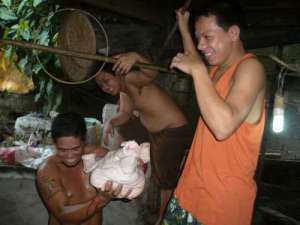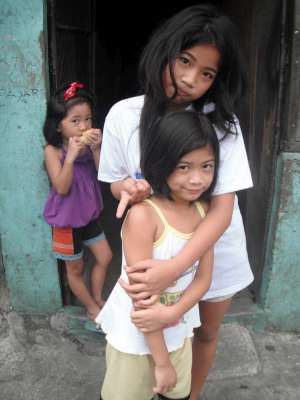There’s a warm breeze this morning. The sun is out in full force, drying up what’s left from the typhoon 2 days ago. The flooded streets had made a clean sweep of the trash & animal excrements, but the strong wind had only added to the mess.
There’s still a tiny pool of water on my neighbor’s tarp that serves as his roof. During the storm, I saw him out on his roof, pulling taught the edges, adding blankets & bricks to seal it from the elements.
It reminds me of when I was a child, building tents & forts with blankets & whatever else was available.
Over the tarp roof is a bushy tree, with one strong branch, from which hangs a rope that disappears from my view on the other side of the roof. If this was my childhood, it might be a rope swing.
My neighbor’s house is fairly protected, nestled in the corner of a 2-story house and a rough brick wall that blocks from my view all but the rooftops of the wealthy neighbors’ 3-story mansions in the gated community. I wonder if their side of the wall is painted. Ours is shabby (but sturdy) and growing moss.
Mama Merly says she wishes the neighbors on this side wouldn’t use tires to hold down their corrugated tin rooftops. They collect water, breeding mosquitoes. I told Mama Merly a while ago they should just cut the tires so that the water will drain. Nothing came of it.
A few weeks ago, there was a pile of tires in the basketball court, (which is the juncture for major footpaths in our neighborhood). I asked my insider-informant about it. “They were probably collected from people’s rooftops. Mosquitoes, you know. People should be using nails, not tires, to hold down their roofs. Tires just take less effort.” I told him about my idea of boring holes in the tires. No response. That takes effort too, I guess.
Maybe the general feeling among some is: “When it becomes a problem, we’ll address it.”
During the storm 2 days ago, my informant says he saw rooftops flying.
There are still too many factors I just don’t know about.
But I can’t help but wonder about the dynamics of:
- People being helpless, or having learned helplessness.
- Oppression — not as anything malicious, but as letting the status quo remain the status quo, without giving thought to how to fix it, or if having thought about it, coming up void of practical, easy solutions.






